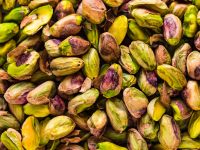Mango is a delicious fruit. Its esteem might have even usurped pineapple as the most popular tropical fruit. But can dogs also enjoy mango? Is mango good for dogs? Today we will find out if this tangy fruit earns a canine safety approval.
Can Dogs Eat Mango?
Mango is delicious in a variety of forms, whether kept sweet or made spicy. While canines shouldn’t be eating spiced or flavored mango, you’ll be pleased to hear that dogs can eat mango.
The American Kennel Club (AKC) ranks mango as a safe fruit for dogs to eat. This means that it’s okay to slip your dog a slice every now and then. Read on to find out the nutritional benefits and potential risks of this fruit.
Is Mango Good for Dogs?
Mango earns the green light for dog fruit safety. But is mango good for dogs to eat? In fact, mango is a healthy fruit for dogs to snack on. The tropical fruit is full of beneficial vitamins for dogs.
Mango contains high amounts of vitamins A, B6, C, and E. It also is full of fiber. As an added bonus, mango is also deliciously sweet. This flavoring is sure to attract dogs. However, this sweetness is also a downside.
Though mango is safe for dogs to eat, it does contain a very high amount of sugar. For this reason, you might opt out of serving your dog mango if he has a problem with his weight or blood sugar.
The USDA estimates that the average mango has 46 grams of sugar, making it a very sugary fruit option. To compare this to other fruits, apples have an average of 19 grams of sugar per medium fruit, while bananas have an average of 14 grams.
However, if you are only feeding mango as an occasional snack and you serve it properly, there shouldn’t be any issues.
How to Serve Dogs Mango
When serving your dog mango, there are some precautions to take.
First, always pit mangos before serving them to your dog. Dogs should never have access to fruit pits, as they pose potential choking hazards. Mango pits actually contain small amounts of cyanide, so they are certainly not safe for dogs. Be aware that fruit pits could also become stuck in your dog’s intestines if swallowed.
Additionally, though mango is a soft fruit, you should cut it into small slices before feeding it to your dog. This will aid in digestion and lower the risk of choking.
Mangos also need to be peeled before serving. This will make digestion much easier for your dog. Lastly, be sure to serve mango in moderation to avoid causing an upset stomach or diarrhea.
Exotic Fruit and Dog Diets
Now that you know the answer to “is mango good for dogs,” let’s see how other exotic fruits stack up. Citizen Canine explores five exotic fruits that dogs can enjoy safely.
In addition to mangos, dogs can eat apricots, cantaloupes, papayas, and boysenberries. Like mangos, apricots always need to be pitted before being served.
Cantaloupes and papayas are both full of nutrients for dogs. Cantaloupes can even improve doggie vision, though the seeds are potential choking hazards. Papaya seeds also shouldn’t be eaten, though the fruit is very healthy for dogs.
Lastly, boysenberries are safe to serve to dogs in moderation. Did any of these fruits surprise you? It’s still always important to research safe serving methods before feeding your dog any human food.
The Mango You Know
Is mango good for dogs? I’m glad you asked. The answer, we’ve discovered, is a yes. Mango contains high amounts of vitamins and fiber. This makes it a great snack for dogs in moderation. So feel free to slip your dog a slice of tropical goodness!
To read more in-depth about tropical fruits your dog can eat, check out can dogs eat pineapple.














